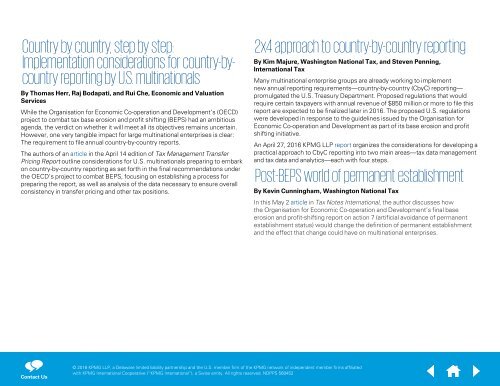Tax Dispute Resolution Quarterly
29rgRWs
29rgRWs
Create successful ePaper yourself
Turn your PDF publications into a flip-book with our unique Google optimized e-Paper software.
Country by country, step by step:<br />
Implementation considerations for country-bycountry<br />
reporting by U.S. multinationals<br />
By Thomas Herr, Raj Bodapati, and Rui Che, Economic and Valuation<br />
Services<br />
While the Organisation for Economic Co-operation and Development’s (OECD)<br />
project to combat tax base erosion and profit shifting (BEPS) had an ambitious<br />
agenda, the verdict on whether it will meet all its objectives remains uncertain.<br />
However, one very tangible impact for large multinational enterprises is clear:<br />
The requirement to file annual country-by-country reports.<br />
The authors of an article in the April 14 edition of <strong>Tax</strong> Management Transfer<br />
Pricing Report outline considerations for U.S. multinationals preparing to embark<br />
on country-by-country reporting as set forth in the final recommendations under<br />
the OECD’s project to combat BEPS, focusing on establishing a process for<br />
preparing the report, as well as analysis of the data necessary to ensure overall<br />
consistency in transfer pricing and other tax positions.<br />
2x4 approach to country-by-country reporting<br />
By Kim Majure, Washington National <strong>Tax</strong>, and Steven Penning,<br />
International <strong>Tax</strong><br />
Many multinational enterprise groups are already working to implement<br />
new annual reporting requirements—country-by-country (CbyC) reporting—<br />
promulgated the U.S. Treasury Department. Proposed regulations that would<br />
require certain taxpayers with annual revenue of $850 million or more to file this<br />
report are expected to be finalized later in 2016. The proposed U.S. regulations<br />
were developed in response to the guidelines issued by the Organisation for<br />
Economic Co-operation and Development as part of its base erosion and profit<br />
shifting initiative.<br />
An April 27, 2016 KPMG LLP report organizes the considerations for developing a<br />
practical approach to CbyC reporting into two main areas—tax data management<br />
and tax data and analytics—each with four steps.<br />
Post-BEPS world of permanent establishment<br />
By Kevin Cunningham, Washington National <strong>Tax</strong><br />
In this May 2 article in <strong>Tax</strong> Notes International, the author discusses how<br />
the Organisation for Economic Co-operation and Development’s final base<br />
erosion and profit-shifting report on action 7 (artificial avoidance of permanent<br />
establishment status) would change the definition of permanent establishment<br />
and the effect that change could have on multinational enterprises.<br />
© 2016 KPMG LLP, a Delaware limited liability partnership and the U.S. member firm of the KPMG network of independent member firms affiliated<br />
with KPMG International Cooperative (“KPMG International”), a Swiss entity. All rights reserved. NDPPS 568452


